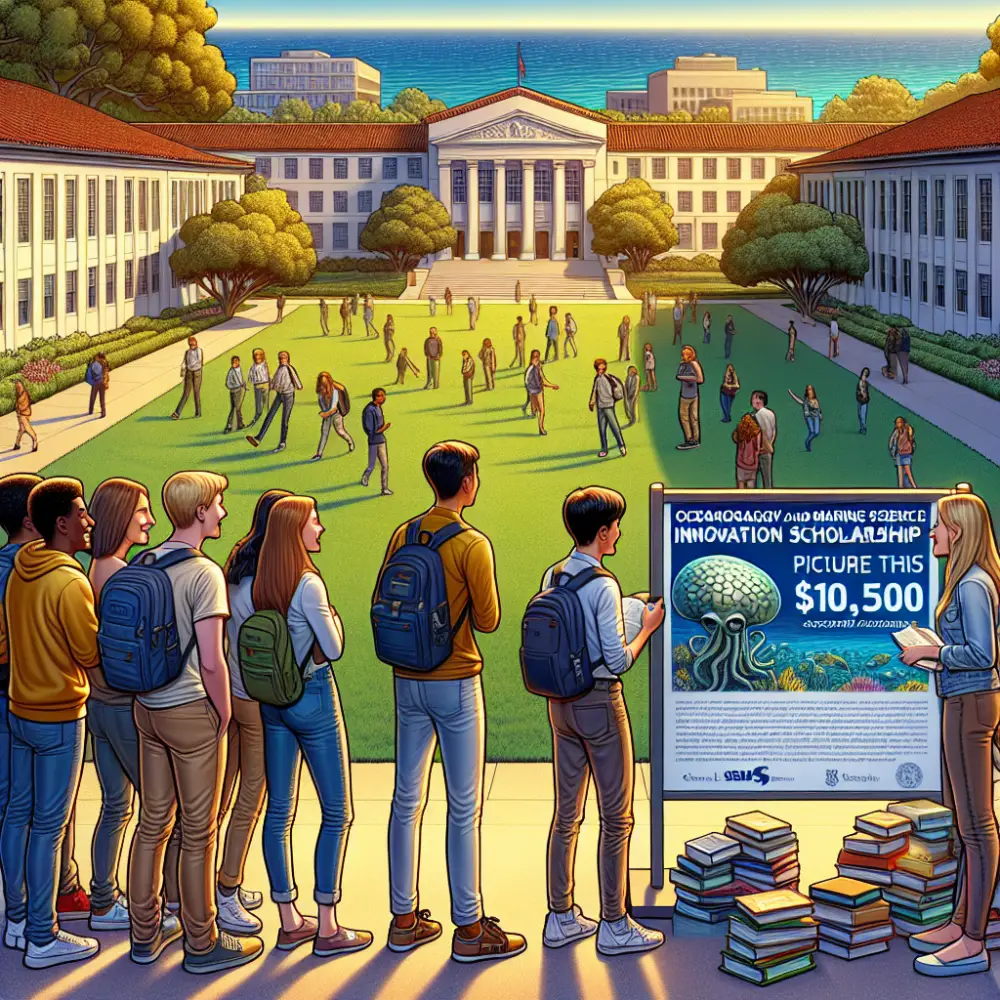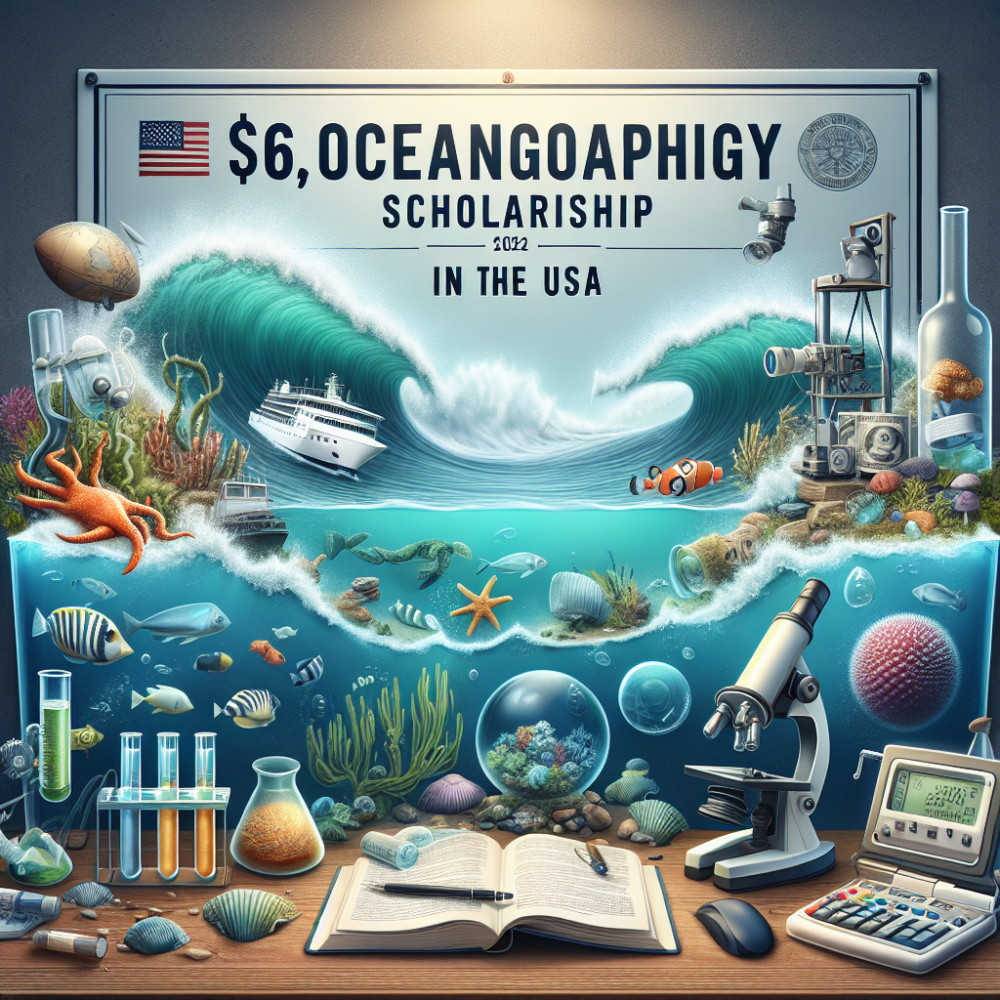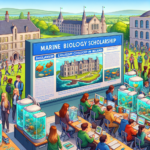Ever since I was a little kid, the ocean called to me. Not just the sandy beaches and crashing waves, but the mysterious, unexplored depths. I dreamt of being an oceanographer – someone who could unlock the secrets of marine life, understand ocean currents, and help protect our blue planet. I pictured myself on research vessels, peering through microscopes at phytoplankton, or even exploring hydrothermal vents in a submersible.
But then, reality hit me like a rogue wave: college is expensive. Really expensive. My family wasn’t wealthy, and the thought of accumulating a mountain of student debt felt like a giant anchor dragging down my dreams. For a while, I honestly thought my passion for the ocean would remain just a hobby, a wistful daydream.
That’s when I stumbled upon something that changed everything: oceanography scholarships. It was like finding a hidden treasure chest beneath the waves. Suddenly, the impossible felt… possible. I realized there were avenues, opportunities, and people out there who believed in aspiring marine scientists like me, enough to help fund our education. This isn’t some dry, academic guide; this is my story, a roadmap based on my own triumphs and a few stumbles along the way, to help you navigate the waters of securing financial aid for your oceanographic journey.
The Spark: Why Oceanography, Anyway?
Before we dive into the nitty-gritty of scholarships, let me tell you why this field consumed me. It wasn’t just about pretty fish. It was about the sheer scale of the unknown. We’ve explored less than 5% of our oceans. Think about that! New species are discovered constantly. The ocean regulates our climate, provides food, and holds cures for diseases. It’s a dynamic, vital system, and understanding it felt like the most important work in the world. If you feel this kind of pull, if the ocean truly speaks to you, then you’re already halfway there. That passion will shine through in your applications.
My First Dive: Where to Even Begin Looking?
When I first started, "oceanography scholarships" felt like a vast, undefined search term. I didn’t know where to start. My first step was pure detective work, and honestly, a lot of trial and error. Here’s where I found the most fruitful hunting grounds:
-
University Department Websites: This was my initial goldmine. If a university has a strong marine science or oceanography program, chances are they offer their own departmental scholarships. I spent hours clicking through "Financial Aid," "Scholarships," and "Prospective Students" sections on university sites. Sometimes these are specifically for incoming freshmen, sometimes for current students, and often for both undergraduate and graduate levels.
-
Professional Oceanographic Organizations: These groups are dedicated to advancing marine science, and they often have scholarship programs to support the next generation. I looked at organizations like:
- American Geophysical Union (AGU): While broad, they have specific sections for ocean sciences and often fund students attending their conferences or pursuing related research.
- American Society of Limnology and Oceanography (ASLO): Directly focused on aquatic sciences, they offer student awards and travel grants.
- Marine Technology Society (MTS): Great for those interested in the engineering and technology side of oceanography.
- Oceanography Society (TOS): Another fantastic resource for those dedicated to the field.
-
Government Agencies: In many countries, government bodies involved in ocean research or environmental protection offer scholarships or fellowships. In the U.S., I looked at:
- National Oceanic and Atmospheric Administration (NOAA): They have various scholarship programs (like the Hollings Undergraduate Scholarship!) that are incredibly prestigious and provide not just money, but also valuable internship experience. This was a big target for me.
- National Science Foundation (NSF): They fund a lot of graduate research, but also have undergraduate research opportunities that can come with stipends.
-
Non-Profit Organizations and Foundations: Many foundations are set up to support specific causes, and ocean conservation is a big one. I searched for groups dedicated to coral reef protection, marine mammal research, sustainable fishing, or general environmental stewardship. A quick Google search for "marine conservation grants" or "ocean science funding" often revealed these.
-
General Scholarship Databases: Websites like Fastweb, Scholarship.com, or Chegg Scholarships were good starting points, though you have to filter a lot to find the specific oceanography ones. I’d input keywords like "marine biology," "ocean sciences," "environmental science," and "aquatic research."
Not All Scholarships Are Created Equal: Understanding the Types I Found
I quickly learned that scholarships weren’t a one-size-fits-all deal. They came in different flavors, each with its own criteria:
- Merit-Based: These were awarded based on academic performance – your GPA, test scores, and sometimes specific coursework. My strong science and math grades were key here.
- Need-Based: These were for students who demonstrated financial need. You usually had to fill out financial aid forms (like the FAFSA in the U.S.) to qualify.
- Research-Specific: Some scholarships were tied directly to a particular research project or area, like "Coral Reef Ecology Scholarship" or "Deep-Sea Vent Research Grant." These often required you to outline a research proposal.
- Diversity/Underrepresented Groups: Many organizations want to encourage a broader range of voices in science. If you belong to an underrepresented group in STEM, look for these specific opportunities.
- Location-Specific: Sometimes local community foundations or state programs offered scholarships for students from their area pursuing certain fields.
- Major-Specific: While "oceanography" is specific, sometimes I found scholarships for broader "STEM" fields, or "environmental science" that I could apply to.
Crafting My Story: The Application Process
Getting a scholarship wasn’t just about finding the right one; it was about convincing them I was the right candidate. This was where the storytelling aspect of my journey really came into play.
-
Grades and Transcripts: This is your foundation. Good grades, especially in science and math, are like your ticket in. They show you’re capable of handling the academic rigor. I made sure my transcript was accurate and sent it early.
-
The Essay: My Voice on Paper: This was my chance to shine. Every scholarship essay asked why I wanted to study oceanography. I didn’t just list my interests; I told a story. I wrote about that first time I snorkeled and saw a vibrant coral reef, or the awe I felt watching a documentary about deep-sea creatures. I talked about specific questions I had, problems I wanted to solve. I showed my heart, my curiosity, and my dedication.
- Tip: Don’t use generic language. Be specific. Instead of "I love the ocean," try "I’m fascinated by the intricate symbiotic relationships within hydrothermal vent ecosystems." Show, don’t just tell.
- Tip: Tailor each essay. Don’t send the same one to everyone. Research the organization giving the scholarship and weave in how your goals align with their mission.
-
Letters of Recommendation: I chose teachers and mentors who truly knew me – not just the ones who gave me good grades, but the ones who saw my passion, my work ethic, and my potential. I asked them well in advance, provided them with my resume, a list of the scholarships I was applying for, and a short blurb about why I was interested in each. This made their job easier and resulted in stronger letters.
-
Resume/CV: Even as a high school student, I started building a resume. Any volunteer work (beach cleanups!), science fair projects, relevant clubs (environmental club!), or even part-time jobs that showed responsibility went on it. For college students, research experience, internships, and relevant coursework became vital.
-
Extracurriculars & Experience: Scholarships aren’t just about grades. They want to see that you’re engaged. I volunteered at an aquarium, participated in citizen science projects monitoring local water quality, and joined my school’s environmental club. Anything that showed I wasn’t just dreaming about oceanography but actively pursuing it helped my applications stand out.
-
Proofread, Proofread, Proofread: I can’t stress this enough. A single typo can make you look careless. I read every application multiple times, then asked a trusted friend or teacher to read it too. Fresh eyes catch mistakes you’ve overlooked.
The Waiting Game and The Breakthrough
After submitting what felt like a hundred applications, the silence was deafening. It was tough, full of self-doubt. I received a few rejection letters, which stung, but I tried to learn from them and not let them discourage me. My mentor reminded me that applying for scholarships is a numbers game, and persistence is key.
Then, one afternoon, an email popped up. The subject line read: "Congratulations – NOAA Hollings Scholarship!" My heart pounded. I opened it, and there it was – an acceptance letter for one of the most prestigious undergraduate scholarships in marine science. Not only did it cover a significant portion of my tuition, but it also included a paid summer internship at a NOAA facility. I was ecstatic.
That wasn’t the only one. I also received a smaller departmental scholarship from my chosen university and a local environmental scholarship. Cumulatively, these awards made my dream of studying oceanography a financial reality. My scholarship wasn’t just a check; it was an invitation, a validation that my passion was worth investing in.
What I Learned: My Top Tips for Aspiring Oceanographers
Based on my rollercoaster journey, here’s the best advice I can offer:
- Start Early, Like, Yesterday Early: Scholarship deadlines creep up fast. Begin your research and application process months before the deadline, especially for the big ones.
- Be Organized: Create a spreadsheet or a document to track each scholarship: name, deadline, requirements, essays needed, recommendation letters requested, and status. It helps keep the chaos at bay.
- Tailor, Tailor, Tailor: I know it’s tempting to use a generic essay, but it rarely works. Each scholarship has a unique mission; make sure your application speaks directly to it.
- Network: Talk to your professors, advisors, and even people working in marine science. They might know about obscure scholarships or be able to connect you with opportunities.
- Don’t Be Afraid to Ask for Help: If you’re struggling with an essay, ask a writing center or a teacher for feedback. If you don’t understand a requirement, email the scholarship contact person.
- Persistence is Your Anchor: You will get rejections. Everyone does. Don’t let them sink your ship. Learn from them, adjust your approach, and keep applying. There are many scholarships out there.
- Show Your Passion: Let your genuine love for the ocean and its mysteries shine through in every part of your application. That authentic enthusiasm is contagious and makes you memorable.
- Look Beyond Just Money: Some scholarships offer mentorship, internship opportunities, or connections to a network of professionals. These are often as valuable, if not more, than the financial award itself.
The Horizon Awaits
My journey from a kid dreaming of the deep to a scholarship-funded oceanography student was a testament to perseverance and the incredible opportunities available if you know where to look. The ocean is vast and full of wonders, and the field of oceanography needs bright, passionate minds to explore it.
If you’re reading this and feeling that same pull towards the waves, don’t let the cost of education deter you. The resources are there. The support is there. Start your research, tell your story, and pour your heart into those applications. The ocean is calling, and with the right scholarships, you too can answer its call and embark on an incredible adventure. Good luck, and may your journey to the deep be filled with discovery!



